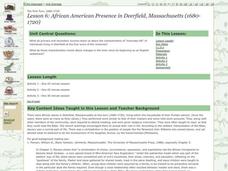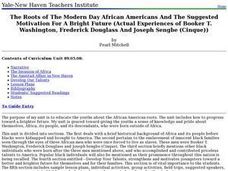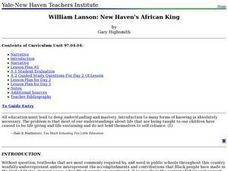PBS
Free, but Not Free: Life of Free Blacks Before the Civil War
Using the family stories of a famous comedian and singer-songwriter, learners consider what life was like for African Americans who were enslaved and free before the Civil War. To complete a concluding activity, they write about the...
Crafting Freedom
Frances Ellen Watkins Harper: Lover of Literacy
This, the sixth in a series of 10 related resources, examines the life and works of Frances Ellen Watkins Harper, an African American author, born in 1825, who advocated literacy for both free and enslaved African Americans.
Curated OER
Exploring the Narrative of an Enslaved African
Students evaluate the role of slave narratives as primary source documents and analyze the Narrative of the Life of Frederick Douglass for revelations about the lives of enslaved Africans during chattel slavery. They examine the role of...
Curated OER
African American Community and Culture
Eighth graders explore the community of enslaved African Americans. In this American History lesson, 8th graders evaluate the importance of cultural expression in the black community. Students study the contributions made by the...
Curated OER
African American Life in the Pee Dee Before the Civil War
Third graders examine the life of the African American in the Pee Dee region during slavery. For this slavery lesson, 3rd graders explore primary and secondary documents related to the topic and create a timeline of when slavery first...
Jamestown-Yorktown Foundation
What Was Everyday Life like in Colonial Virginia?
What was everyday life like in Colonial Virginia? To find the answer cooperative groups work collaboratively to read an informational handout and complete a graphic organizer. The speaker of the group then shares their new-found...
PBS
African American History: Climbing the Wall
Imagine the challenge of trying to trace your family genealogy if no records were kept of births and deaths. Where would you look for information? What types of documents could provide you with the information you seek? History...
Crafting Freedom
George Moses Horton: Crafting Virtual Freedom Through Poetry
What is "virtual freedom"? How about "enslaved entrepreneurship"? Class members will learn about these terms and much more as they read the poems and examine the life of George Moses Horton.
Center for History Education
Daily Lives of Slaves - What Really Happened?
The stories of enslaved people are preserved forever thanks to the Great Depression. Budding historians explore slave narratives gathered by a federal government initiative to discover what life was actually like for enslaved people....
National Woman's History Museum
Sally Hemings: Raising a Family Amidst the Brutality of Slavery
Pupils may know about early American figures such as Phyllis Wheatley and Abigail Adams, but what about Sally Hemings? Sally Hemings was the mother of Thomas Jefferson's children, but she is often left in the shadows of history....
Crafting Freedom
George Moses Horton: Slavery from a Poet's Perspective
After reading about the life of George Moses Horton, the first slave to publish anti-slavery poetry, learners will recall his major accomplishments, provide a summary of the obstacles he faced, and identify common aspects of the...
Curated OER
African American Presence in Deerfield, Massachusetts (1680-1720)
Eleventh graders explore primary and secondary sources involving "everyday life" of individuals living in Deerfield at the four turns of the centuries. They learn what these characteristics reveal since the town's beginning as an English...
Curated OER
The Roots of The Modern Day African Americans And The Suggested Motivation For A Bright Future (Actual Experiences of Booker T. Washington, Frederick Douglass And Joseph Sengbe (Cinque))
Fifth graders examine the roots of African American pride and accomplishments. Individually, they are assigned an African country for them to research. In groups, they discover the life and works of Frederick Douglass, Booker T....
Curated OER
William Lanson: New Haven's African King
Students discuss the misrepresentations of African Americans in the United States. In groups, they examine the life and accomplishments of William Lanson and the importance of extending the Long Wharf. Together, they pretend they lived...
Curated OER
Scaffolded Reading of "Drawing of an African Burial Ground Grave in Situ"
The class reads the description of the "Drawing of an African Burial Ground Grave In Situ" then completes a work sheet. They act like archaeologists and answer a series of critical thinking questions to better understand the historical...
Crafting Freedom
Harriet Jabocs and Elizabeth Keckly: The Material and Emotional Realities of Childhood in Slavery
Through the journals written by Harriet Jacobs and Elizabeth Keckly, young readers gain insight into the lives of two enslaved children on nineteenth-century plantations.
Curated OER
The Colonization of Liberia
Students analyze how slavery shaped social and economic life in the South. They study methods of passive and active resistance to slavery, and the similarities and differences between African-American and white abolitionists.
Curated OER
The African Burial Ground
Students analyze African American burial grounds. In this African American history lesson, students draw conclusions about African American communities in early New York and consider how archeology made it possible to study the communities.
Crafting Freedom
George Moses Horton: Slavery from a Poet's Perspective
Pupils have the unique opportunity to learn about the institution of slavery by reading first-hand experiences as described by George Moses Horton, the first slave to publish anti-slavery poetry.
Jamestown-Yorktown Foundation
What Was Everyday Life like in Colonial Virginia?
After reflecting on jobs people perform in the present day, scholars discuss what they believe jobs would have been like in Colonial Virginia during the American Revolution. Small groups then perform a jigsaw using informational packets....
North Carolina Consortium for Middle East Studies
Voices from the Trans‐Atlantic Slave Trade
Young historians trace the roots of African slavery and learn about the causes and effects of the Trans-Atlantic slave trade through a PowerPoint presentation and by reading and discussing excerpts from the book Copper Sun.
Crafting Freedom
Man in the Middle: Thomas Day and the Free Black Experience
How did free and enslaved blacks work to craft freedom for themselves and their families before the Civil War? Young historians read about the life of Thomas Day, a free black man who also owned slaves and had abolitionist ties in...
National Park Service
Lesson 3: Resistance
During the time of slavery, resistance was a way of life for the men and women held in bondage. Using music as evidence of their fight against oppression, learners explore how enslaved people fought back. Writing prompts round out the...
Curated OER
Families in Bondage
Students examine actual letters writen by slaves and write essays based on these letters describing what it might have been like for an African American family living in the South during that time period.

























